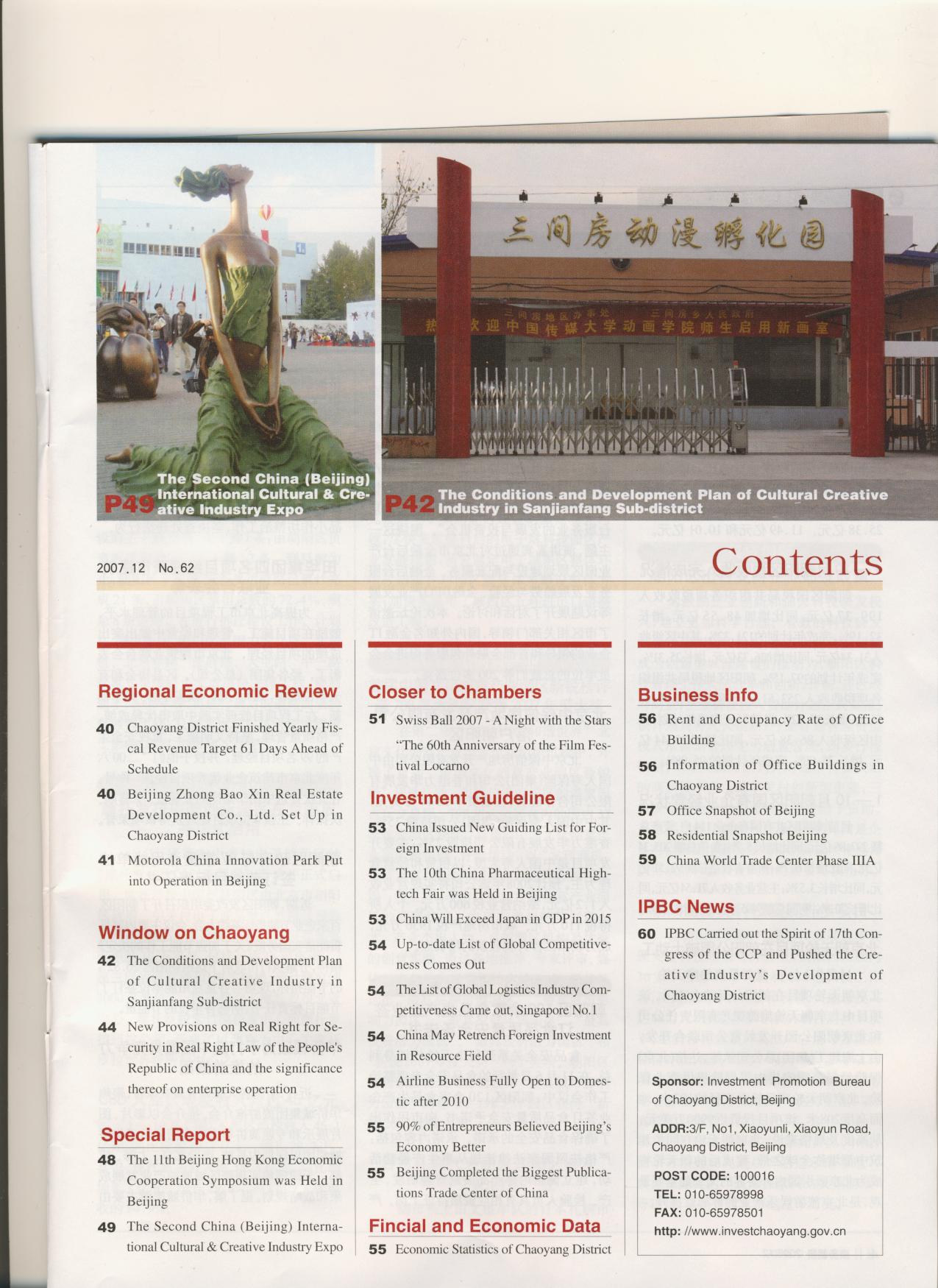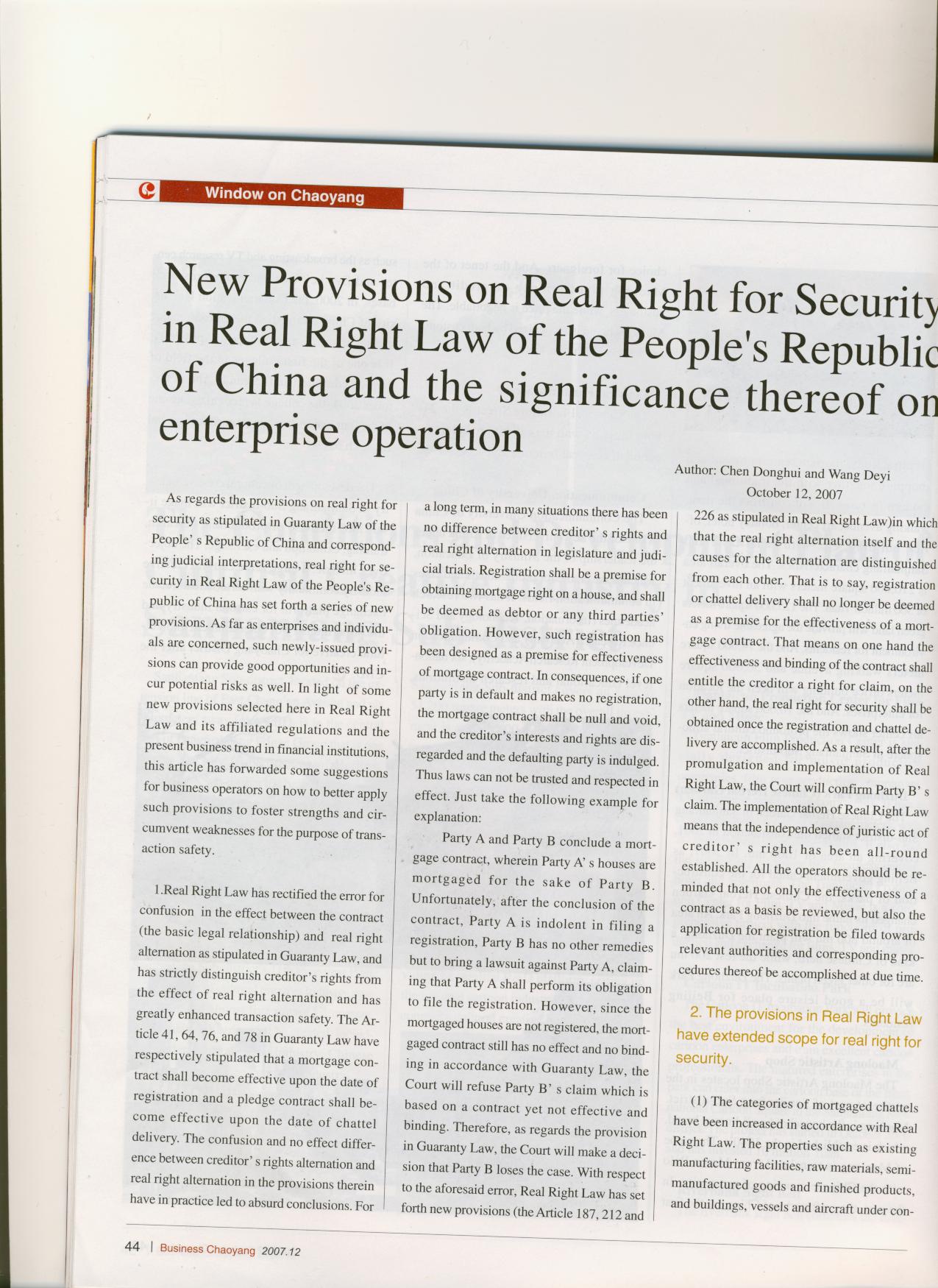

 010-80850896;13001093985
010-80850896;13001093985
Author: Chen Donghui and Wang Deyi
October 12, 2007
As regards the provisions on real right for security as stipulated in Guaranty Law of the People’s Republic of China and corresponding judicial interpretations, real right for security in Real Right Law of the People's Republic of China has set forth a series of new provisions. As far as enterprises and individuals are concerned, such newly-issued provisions can provide good opportunities and incur potential risks as well. In light of some new provisions selected here in Real Right Law and its affiliated regulations and the present business trend in financial institutions, this article has forwarded some suggestions for business operators on how to better apply such provisions to foster strengths and circumvent weaknesses for the purpose of transaction safety.
1.Real Right Law has rectified the error for confusion in the effect between the contract(the basic legal relationship) and real right alternation as stipulated in Guaranty Law, and has strictly distinguish creditor’s rights from the effect of real right alternation and has greatly enhanced transaction safety. The Article 41,64,76,and 78 in Guaranty Law have respectively stipulated that a mortgage contract shall become effective upon the date of registration and a pledge contract shall become effective upon the date of chattel delivery. The confusion and no effect difference between creditor’s rights alternation and real right alternation in the provisions therein have in practice led to absurd conclusions. For a long term, in many situations there has been no difference between creditor’s rights and real right alternation in legislature and judicial trials. Registration shall be a premise for obtaining mortgage right on a house, and shall be deemed as debtor or any third parties’ obligation. However, such registration has been designed as a premise for effectiveness of mortgage contract. In consequences, if one party is in default and makes no registration, the mortgage contract shall be null and void, and the creditor’s interests and rights are disregarded and the defaulting party is indulged. Thus laws can not be trusted and respected in effect. Just take the following example for explanation:
Party A and Party B conclude a mortgage contract, wherein Party A’s houses are mortgaged for the sake of Party B. Unfortunately, after the conclusion of the contract, Party A is indolent in filing a registration, Party B has no other remedies but to bring a lawsuit against Party A, claiming that Party A shall perform its obligation to file the registration. However, since the mortgaged houses are not registered, the mortgaged contract still has no effect and no binding in accordance with Guaranty Law, the Court will refuse Party B’s claim which is based on a contract yet not effective and binding. Therefore, as regards the provision in Guaranty Law, the Court will make a decision that Party B loses the case. With respect to the aforesaid error, Real Right Law has set forth new provisions (the Article 187,212 and 226 as stipulated in Real Right Law)in which that the real right alternation itself and the causes for the alternation are distinguished from each other. That is to say, registration or chattel delivery shall no longer be deemed as a premise for the effectiveness of a mortgage contract. That means on one hand the effectiveness and binding of the contract shall entitle the creditor a right for claim, on the other hand, the real right for security shall be obtained once the registration and chattel delivery are accomplished. As a result, after the promulgation and implementation of Real Right Law, the Court will confirm Party B’s claim. The implementation of Real Right Law means that the independence of juristic act of creditor’s right has been all-round established. All the operators should be reminded that not only the effectiveness of a contract as a basis be reviewed, but also the application for registration be filed towards relevant authorities and corresponding procedures thereof be accomplished at due time.
2. The provisions in Real Right Law have extended scope for real right for security.
(1) The categories of mortgaged chattels have been increased in accordance with Real Right Law. The properties such as existing manufacturing facilities, raw materials, semi-manufactured goods and finished products, and buildings, vessels and aircraft under construction fall into scope for mortgaged chattels as stipulated in Real Right Law. Meanwhile there is a miscellaneous provision that states that “other properties not prohibited from being mortgaged by any law or administrative regulation” can be mortgaged. In view of juristic theory, any properties as not prohibited from being mortgaged by any law or administrative regulation can be mortgaged. As a mortgaged chattel, mortgage may be established on a ring, an antique and suit.
(2) As regards pledge, Real Right Law prescribes that fund units and account receivables can be treated as properties that may be pledged. The Article 223 therein stipulates that account receivables may be the subject matter of pledge right. Account receivables shall include the following particulars: ① Creditor’s right arising from, including sales for goods, supply and consumption of water, electricity, gas and heat, and licensed utilization of intellectual property; ② Creditor’s right arising from lease, including lease of realty and chattel;③ Creditor’s right arising from services provided by the tertiary industry, such as those in telecommunication, park sights, public traffic, school and legal services offered by lawyers; Creditor’s right of seeking profits from real properties concerning highway, bridge, tunnel and ferry; ④ Creditor’s right arising from providing loans and other credit loans; ⑤ Creditor’s right arising from deposits; ⑥ Other creditor’s rights. In conclusion, the range for account receivables is extensive. Due to strict restrictions imposed by prior laws, account receivables may not be pledged. Nowadays the newly-issued Real Right Law enables a borrower to obtain loans by means of such pledged chattels as their existing assets, raw materials, semi-manufactured goods and finished products and those to be owned in future. In China, small and medium enterprises’ main capital is account receivables which amounts to 60% of their assets or over. Those include lots of service-oriented enterprises (for example, services for providing software, dining and counseling) and sale providers whose account receivables occupy their main capital. Account receivables entitled to be pledged are conducive to finance and promote the prospectus of market economy.
(3)Establishment of floating mortgage The system of floating mortgage is rooted in Common Law. Floating mortgage originally means an enterprise may have mortgaged its possessed properties right. In case the mortgagor fails to perform its due debts, the mortgagee shall be entitled to dispose of the mortgagor’s properties. In light of domestic actual circumstance, Real Right Law has set forth new provision on the basis of introduce of foreign system therefrom. The article 181 in Real Right Law stipulates that floating mortgage means an enterprise, individual industrial and commercial household or agricultural production operator may mortgage existing manufacturing facilities, raw materials, semi-manufactured goods and finished products or those to be owned in future, and when the mortgagor fails to pay its/his due debts or any circumstance as stipulated by the parties concerned for realizing the right to mortgage arises, the mortgagee has the right to seek preferred payments from the chattels existing at the time of the realization of the right to mortgage. The floating mortgage may not challenge the buyer who has paid a reasonable price and obtained the mortgaged property in normal business operations. Real Right Law applies not only to the corporation legal person but also to partnership and individual industrial and commercial household. The floating mortgage system is designed to overcome the difficulty in obtaining bank loans for small and medium enterprises.
For instance, within its two-year operation, a network technology company, incorporated by two undergraduates, has continuously extended its scales. However its obtained loan has been paid for purchase of net server facilities which have been leased to its clients, and in order to enlarge its market share, the rent payments will not be effected until a specific term after those facilities are leased. Its account receivables cumulatively amount to one million yuan, but its actual income can not satisfy its need for cash flow. Therefore the company have been confronted with the common problem for every newly- established small and medium size enterprise that its capital is greatly in short. In accordance with the provisions as stipulated in Guaranty Law that the right for collecting account receivables may not be pledged, it is impossible for the company to obtain enough loans due to lack of mortgagable realties. Real Right Law paves the way for financing by means of chattel security. The company may not only have pledged its amount receivables but also have its amount receivables mortgaged abiding by floating mortgage system to finance.
(4) For the purpose of obtaining loans, an enterprise shall firstly acquire trust from banks and then be fully prepared. It shall be reminded that with the promulgation and enforcement of affiliated laws and regulations, all financial institutions will introduce corresponding financial products and domestic and foreign banks will compete with each other and focus on the operation of chattel for security. With the promulgation and enforcement of a series of such matching ordinance as Measures for the Registration of Pledge Receivables (issued by Bank of China) and Measures for Chattel Mortgage Registration (issued by State Administration for Industry and Commerce) and the development in network technology, China will gradually set up and perfect a united chattel registration system that may remove obstacles regarding mechanism and technology for financial institutions to introduce more financial products. For a long term, the bank as a lender would rather provide loans to magnitude enterprises than to small and medium enterprises and would rather provide loans to stated-owned enterprises than to private-owned enterprises. Generally, magnitude enterprises are preferred by the bank in pursuit of providing loans for their consolidated assets, stable safeguard, low management cost and controllable risks. On the contrary small and medium enterprises must endeavor to seek loans from the bank. But nowadays the bank has to seek new business field for profits since most business in relation with magnitude enterprises has been operated. Meanwhile, the foreign Bank of East-Asia, Standard Chartered, The Hongkong and Shanghai Banking Corporation Limited and Citibank have been qualified as enterprise legal person in China to launch RMB business at April 1st,2007. Their business is basically oriented towards and concentrated on small and medium enterprises. Under such circumstance will domestic banks be reluctant to abandon any potential client groups. Since domestic financial market has been open to foreign-owned banks, domestic banks have to make new strategies to effectively enhance their capacities in market competition. At present the main domestic banks, in order to adapt to the latest capital market, begin to resort to small and medium enterprises for business development, and speed up their adjustment in credit and structure to establish their comprehensive management pattern and operation mechanism to gradually introduce financing services (For example, such financial products as named “CHENGZHANG ZHI LU” and “SUDAITONG” have been introduced by the Construction bank) for small and medium enterprises. As for a bank, whoever first develops new financial products and high quality services grasps prime opportunities that arise in new market. The situation that it is difficult for small and medium enterprises to finance will soon be greatly changed.
(5)Risk presentation and suggestion on enterprise transactions Real Right Law not only increases categories of properties and rights for security but also enlarges the range within one category. Therefore An enterprise shall have more room to choose real right for security. An enterprise as a creditor shall choose realty mortgage in priority during the course of business transaction when it requires a debtor to provide security. In case a small or medium enterprise, a individual industrial and commercial household and other debtors have no land, houses or mechanical facilities to mortgage, an enterprise as a creditor can take into account other chattels mortgage or even floating mortgage. Although chattels mortgage and floating mortgage in some degree decrease the realization for real right for security, it is better than no security, and an enterprise can get more safeguard over its interests so as to decrease the risk on account receivables when a transaction has to be made in the case. When an enterprise is a debtor or provides security for any third party, it shall choose real right for security with less possibility of realization. Giving the increase of categories of real right for security and the enlarged scope for chattel mortgage, when an enterprise purchases mechanical facilities and other chattels, or establishes security, strict review shall be imposed on such properties to make sure whether any chattel mortgage right or other real right for security are established on them or not. With regard to acquisition and merger and shares transfer, the implementation of Real Right Law undoubtedly increases difficulty in examining and determining actual status of a company as a security provider, and imposes more risks and impediments to precisely judge actual status of a target company.
In order to have a full knowledge on its status of assets, any entity or individual must decide whether a target company assumes any contingent debts (providing security to any third party) besides tangible assets and debts in a transaction for shares transfer or acquisition. Real right for security will not come into effect or can not challenge any bona fide third party until proper registration procedures thereof are handled in relevant authorities. Therefore any assignee is required to check the record in the ownership certificate of the realty and the realty register as well. As regards a chattel, it shall be noticed whether it is delivered to an assignee or not while relevant written materials (assets sheet and sales contract) are examined, and checked in competent registration authorities (such as credit consulting organs , administrative department for industry and commerce, land administrative departments, transportation administrative departments and securities depository and clearing institution where the target company is domiciled ) in case any discrepancy occurs in the record of such certificates and the registers. The assets status of the target company can be actually demonstrated and investment risks can be reduced to maximum degree only after all detailed records therein have been checked to prove true. In addition, a contract of acquisition and merger, particularly, for assets acquisition shall be designed in accordance with relevant provisions in Real Right Law prior to its signature. For example, in such contract the acquired or merged party shall be required to guarantee or promise that there are no real rights for security, established over its assets, that the acquiring or merging party is unaware of, and otherwise shall assume liabilities therein.
3. It should be reminded that Real Right Law extends the scope for lien available to enterprises. Guaranty Law has set strict restrictions on establishment of lien. In accordance with the provisions therein lien can only be established based on claims that are incurred by such specific legal relationship as contracts of deposit, transportation contracts and work contract. But, as stipulated in Real Right Law, The chattels taken as lien by the creditor and the debtor's rights shall fall into a same legal relationship, except for the lien between enterprises. Since such prescription means lien between enterprises occurs unnecessarily based on the same legal relationship, lien can be so easily established between enterprises that an enterprise as a debtor had better stipulate in the contract that lien shall be excluded and certain chattels shall not be taken as lien against the creditor claims. Of course, an enterprise may take into account the realization for lien to maintain its legal interests when its interests are infringed on.
4. Real Right Law has created an enforcement system of real right for security through which enforcement can be accomplished in a prompt, convenient, cheap and efficient way. Compared with prescriptions in Real Right Law, real right for security as prescribed by Guaranty Law can only be enforced until debts have not been paid off after the expiration of payment term, which may not cover various cases that the debtor is in breach in practice; moreover, the secured debts shall be realized through court’s decision, and the enforcement of real right for security usually takes quiet a long time and changes may occur at any time during the course of enforcement thereof. Real Right Law stipulates the debtor fails to pay due debts or any circumstance for realizing the mortgage (pledge)right as stipulated by the parties happens, the creditor has the right to seek preferred payments from the mortgaged (pledged) chattels. That is to say, in term of their rights and remedies, the parties concerned in the contract may reach an agreement that the creditor enjoys the right as stipulated in the contract to reclaim or dispose of properties for security without resorting to court for decision. Thus an enterprise as a creditor may directly claims auction or selling off in accordance with the contract and steps up its realization for real right. An enterprise may directly apply to a court for enforcement of auction and selling off by any agreed security contract or any certificate of real right for security instead of a court’s decision. To gain higher legal effect, notarization is preferred while enterprises sign a contract.
When exercising its real right for security, an enterprise shall pay special attention to one more modification on the term for exercising such right as stipulated in the Real Right Law. The term therein, shorter than that in the provision that creditor may exercise real right for security within 2 years after limitation of action for principal creditor’s right as stipulated in Guaranty Law, is as long as the limitation of action for principal creditor’s right. The term in Real Right Law requires the creditor shall claim its mortgage right meanwhile a lawsuit is brought in relation with the principal creditor’s right. Therefore not only the creditor’s right but also the corresponding mortgage right will be challenged after the expiration of limitation of action for principal creditor’s right. As a creditor, an enterprise shall actively exercise its right to protect its legal right and make sure mortgage right is claimed within limitation of action for principal creditor’s right.
In many aspects, the provisions in Real Right Law have rectified and modified those in Guaranty Law. The modifications are demonstrated in scope of creditor's rights under the mortgage at maximum amount, relationship between physical security and personal security, remedies for devaluation and reduction of mortgaged properties, subordination of security contract and so on. The authors just choose one aspect to expound in this article. In general, the major provisions on real right for security in Guaranty Law almost have no room for application since such provisions have been incorporated into Real Right Law, or rectified or revoked by Real Right Law. During its daily operation, an enterprise shall direct its attention to those new provisions and take advantage of them to maximum degree.

 扫一扫了解更多
扫一扫了解更多 扫一扫了解更多
扫一扫了解更多COPYRIGHT©2022ALL RIHGTS RESERVED 北京寻真律师事务所 版权所有 京ICP备2022011643号